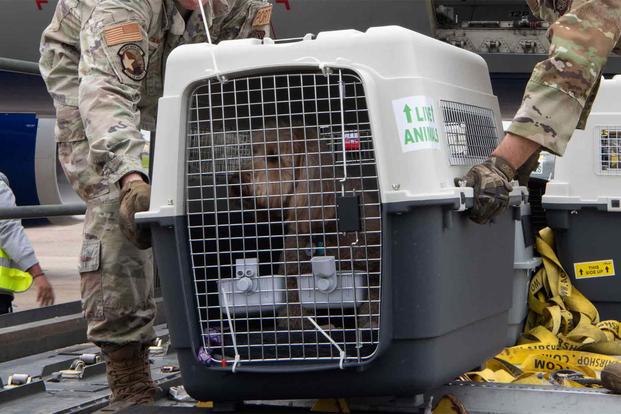Two dogs died aboard a Patriot Express flight between Osan Air Base in South Korea and Seattle on Thursday, roughly a year after the Air Force announced new policies following a string of pet deaths.
Jessica Brown, a spokeswoman for Air Mobility Command, told Military.com in an emailed statement that the dogs were found dead once the Patriot Express flight landed in Seattle. One was a French bulldog, and the other was an English bulldog; their names were not disclosed.
The dogs and their owners boarded their flight at Osan Air Base and had a four-hour stop at Misawa Air Base in Japan before their final landing in Seattle.
Read Next: Pentagon Set to Allow Calculator Use on Military Entrance Exam as Recruiting Slumps
“During that time, the pets were off-loaded and connected with their owners to visit and walk them before passengers and pets were boarded,” Brown said. “While there was an additional delay after everyone was loaded due to the need to adjust the flight plan for weather, the pets were checked again prior to takeoff when they were found to be in good condition and with water.”
Brown said Air Mobility Command leadership is “analyzing the circumstances of this mission” and did not have a timeline or a presumed cause of death for the two dogs.
Patriot Express, which is managed by Air Mobility Command, is a flight option for service members who receive permanent change of station, or PCS, orders and must uproot their lives to move around the world for their military careers. It is a free or relatively low-cost option compared to commercial airlines and allows for more flexibility than major airlines when it comes to traveling with pets.
Liz Hensel, the CEO and founder of Leave No Paws Behind USA -- a nonprofit that helps military families with the costs and logistics of transporting their pets when assigned to a new duty station -- was upset by the latest news.
“I am disappointed and heartbroken for the family who lost their two dogs,” Hensel told Military.com in an emailed statement. “Not only is this unacceptable but it could have been completely avoidable. Service members shouldn't have to think, ‘Is my pet going to survive this flight’ when PCSing.”
Hensel shared a Facebook post that was circulating online from the owners that said the names of the dogs were Soju and Winter.
“Losing one of them would be hard, but losing two, I have no words to say,” the Facebook post from the owners read. “Nothing will ever be the same for our family after today.”
Air Mobility Command wouldn’t confirm if the Facebook post was describing the incident on the Patriot Express flight.
“AMC leaders were able to meet with the family this afternoon to express condolences, answer their questions and offer support,” Air Mobility Command spokeswoman Lindsey Wilkinson told Military.com in an email.
In July 2022, the Air Force began reviewing its policies for transporting service members' pets across the globe following the deaths of four animals that summer during flights.
Gen. Mike Minihan, head of Air Mobility Command, said in a letter last year that the deaths were "unacceptable" and promised changes.
"As a pet owner with five overseas tours, I'm intimately aware of the risk, expense, and extreme concern when it comes to these important members of our families," Minihan wrote in a July 15 letter. "AMC is reviewing every aspect of Patriot Express pet travel, including equities beyond our responsibility, to further strengthen pet safety."
Air Mobility Command has transported nearly 46,000 pets for service members since 2017, with 16 dying during that time, the Air Force said in a statement last year.
The service said 14 were snub-nosed breeds of dog, which are more susceptible to long-term breathing problems and can't cool down as quickly in hot environments, according to the American Kennel Club.
Last year, on July 1, a 10-year-old Pomeranian mix named Kolbie owned by a Marine Corps family died from heatstroke during a Patriot Express flight in Japan. That same month, a French bulldog died in its travel crate on July 14 at the Kadena Air Base terminal in Okinawa, according to the military newspaper Stars and Stripes.
Minihan's letter last year and an Air Force statement at the time both mentioned an additional pet death in July, and also acknowledged that a dog had died earlier while traveling from Andersen Air Force Base to Alaska -- bringing the total to four animal deaths that summer.
Brown said Air Mobility Command has made “multiple changes over the last year to improve the safety of our pets as they travel.”
Recent improvements include allowing pets into its climate controlled terminals where they can stay with their owners until boarding; pets being loaded as late as possible; using air conditioning units to cool the lower compartment in the aircraft if and when available; making sure pets are not in the lower compartment for the full duration of the mission route; and putting them in at the latest time possible for the next segment of a flight.
“There are trends of certain breeds, such as snub/short-nosed dogs, that are at greater risk for air transport, which is briefed to travelers prior to their travel, and travelers are required to acknowledge they've considered the risk,” Brown said. “A single pet fatality is felt across our command, but our initiatives have reduced fatalities approximately 60% from 2022.”
-- Thomas Novelly can be reached at thomas.novelly@military.com. Follow him on Twitter @TomNovelly.
Related: After 4 Pets Die During PCS Flights, Air Force Reviewing Policies













